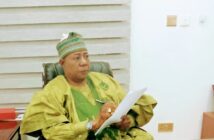Corruption is a bad omen for any society. It denies relevant development and aggravates poverty because the resources that are supposed to be utilised for the benefits of citizens are stolen and stashed, mostly in foreign banks, leaving people destitute of good hospitals, schools, infrastructures, jobs and other things that life demands.
It is because of the evil of corruption that countries like China, Vietnam, Indonesia, among others, treats corrupt cases with heavy hands. In fact, China places stiffer penalty for corruption and in some cases it attracts death. This is to serve as deterrent to others. In Indonesia, official corruption attracts long and harsh jail terms with hard labour.
For Nigeria, corruption was a pass time; hence, essential social services are hampered. So bad was the situation before President Muhammadu Buhari took office in 2015. In retrospect, to state that it was because of the state of corruption that Nigerians voted Buhari overwhelmingly to come and clean the mess is to restate the obvious.
True to their expectations, Buhari did not disappoint Nigerians, as the rhythm in the anti-corruption war has changed. This earned Nigeria a pride of place in the international community. It was because of this development that the African Union (AU), at the end of its 29th Ordinary Session of the Assembly in Addis Ababa in 2017, endorsed President Buhari to champion its anti-corruption course entitled, “Winning the Fight Against Corruption: Sustainable Path to Africa’s Transformation.’’
In some European, Asian and African countries I have visited recently, the records of assessment I sighted showed that President Buhari’s anti-corruption war is quite strategic and advanced. Most of the anti-graft experts I interacted with admitted that Nigeria is witnessing smooth-sailing economic growth, with an improved image among the international community because of the current fight against corruption championed by Buhari.
Before Buhari’s era, the major anti-corruption agencies were mere tools in the hands of ‘powerful’ government officials who used them to witch-hunt political opponents. However, Buhari heralded a new era, with the Economic and Financial Crimes Commission (EFCC), Independent Corrupt Practices and other Related Offences Commission (ICPC) and the Code of Conduct Bureau (CCB), suddenly waking up to their mandate.
Before this time, corrupt cases can drag in courts for as long as 10 to 20 years, at the end of which the case will be thrown out or quashed. However, with the coming of Buhari, the narrative has changed drastically. Prosecutions by anti-corruption agencies have become more diligent, leading to more convictions, including high profile persons like former Governors Joshua Dariye of Plateau State and Jolly Nyame of Taraba State, both of whom are still serving their jail terms.
To prove that President Buhari meant business, both Dariye and Nyame were members of Buhari’s political party, the All Progressives Congress (APC). Needless to state the conviction of a sitting Senator, Orji Uzor Kalu, also of the APC, for corruption before the Supreme Court gave him reprieve.
One outstanding thing with President Buhari’s war against corruption is that it is a multi-pronged approach. As operatives of Anti-corruption agencies are going after criminals, institutional reforms were also being used to block leakages in government finances. For example, the IPPIS led to weeding out ghost names from payrolls of the federal civil service, thereby saving billions of naira of government funds that could have gone into private pockets.
Just this week, Justice N.E. Maha of the Federal High Court on Monday February 14, ordered the final forfeiture of 24 properties held by fronts and proxies to a top military officer to the federal government. Some properties were seized by EFCC from a military officer, whose name was not mentioned.
Nigeria has also started the implementation of a harmonised Anti-Corruption Strategy signed by President Buhari in 2019. The enforcement seeks to enhance the efforts to recover stolen public assets and ensure better collaboration between anti-graft agencies.
Nigeria joined the Open Government Partnership (OGP) in 2016 and developed the National Action Plan (NAP). The country is implementing 16 commitments – fiscal transparency, anti-corruption, extractive transparency, inclusiveness, and public service delivery, among others.
Because of his credibility, immediately Buhari assumed office, the international community cooperated with him to trace and secure repatriation of looted funds. This is so because they were convinced that the Nigerian leader would utilise recovered funds judiciously. So far, some high-profile recoveries include the $322 million Abacha Loot from the government of Switzerland; $311 million Abacha Loot from the Bailiwick of Jersey; $100 million recovered by the EFCC for the Nigerian Ports Authority (NPA), from a company operating in the oil and gas sector; 4.2 million pounds sterling of Ibori Loot from the UK Government; 53 billion Naira for the Federal Mortgage Bank of Nigeria (FMBN), from a real estate developer; $43 million security funds from an apartment in Ikoyi; and 189 billion Naira in ‘restrained’ funds from inflated personnel budgets, following ICPC’s scrutiny of practices, systems and procedures of MDAs’ personnel cost from 2019 to 2020. It is only under President Buhari this type of sting action against corruption can happen.
ICPC’s audit of constituency projects covering 2015 to 2018 helped recover N2 billion of diverted funds and assets, and also forced about 300 contractors to return to site to complete abandoned or poorly executed projects.
Also, in August 2021 the ICPC commenced the third phase of this constituency and executive projects tracking exercise. In 2019 alone, ICPC also recovered N32 billion worth of land, buildings and vehicles. In 2021, the EFCC and ICPC continued their recovery efforts, with billions of naira in cash assets already recovered through interim or final forfeiture orders.
Under Buhari, the National Assembly and executive are cooperating to curb corruption. Ministries, Departments, and Agencies (MDAs) had a standing order to submit reports on their fight against corruption and achievements recorded. They include the ministries of Justice, Finance, Budget and National Planning, EFCC and ICPC.
Others are National Orientation Agency (NOA), National Information Technology Development Agency (NITDA), Universal Basic Education Commission (UBEC) among others.
Under Buhari, the Attorney General of the Federation and minister of Justice, Abubakar Malami (SAN) has discharged the core constitutional duty of that office, which is to institute and undertake criminal proceedings against any person before any court of law on behalf of the Nigerian State, with consummate exactitude.
More than any time in our history, AGF Malami, in exercising the powers of his office as spelt out in section 174 and 211 of the 1999 Constitution (as amended), has continued to uphold due regard for the public interest, the interest of justice and the need to prevent abuse of legal and due process.
Perhaps, one of the immeasurable demonstrations of Malami’s stubborn adherence to due process is in the process of recovery of Nigeria’s stolen funds and assets. His strict adherence to President Buhari’s anti-corruption stance has helped Nigeria recover huge sums stashed in both local and foreign banks. One of such humongous recoveries is the repatriation of $311million looted by Sani Abacha from the United States.
Enemies within and outside the country threw everything to the works to frustrate these recovery but because of the deft manner AGF Malami handled the process, the enemies of Nigeria were put to shame and the funds were repatriated and used for the benefit of Nigerians. Because of his expertise, the federal government did not need to engage any third party in the repatriation of the stolen public funds. The transparency and accountability in handling of process, leading to the repatriation of the money demonstrate one thing about the Buhari administration that the president is a man of character with utmost respect for the rule of law.
Also, the Code of Conduct Tribunal (CCT) is not left out in the ongoing anti-graft war. The tribunal has contributed immensely in the prosecution of high profile cases involving the political class and public office holders. It has also secured some convictions for ICPC and EFCC under the Buhari administration, unlike incidences of trial without conviction during the past administrations.
-Ibrahim is director, Communications and Strategic Planning, of the Presidential Support Committee (PSC).


